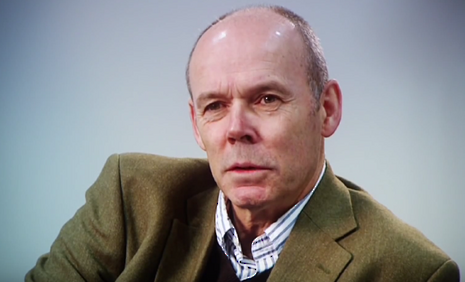Sir Clive Woodward talks leadership at Churchill College
In a speech entitled ‘The DNA of Success’, England’s World Cup-winning rugby coach discussed the importance of IT and business experience to his sporting successes

When England rugby fans reminisce about their country's famous World Cup win in 2003, they probably picture a triumphant Jason Robinson scoring the opening try in the corner against the Wallabies, an ecstatic Lawrence Dallaglio parading about with his medal around his neck, England flag held aloft, or Jonny Wilkinson’s dramatic extra-time drop goal that consigned Australia to defeat on home turf. They probably do not think about computers and statistics. But, explained Sir Clive Woodward on Tuesday, they played almost as big a role.
The Cambridgeshire-born coach, whose England team overcame then-defending champions Australia 13 years ago by 20 points to 17, addressed a crowd at Churchill College on what makes an effective leader, and how IT can be used to steal a march on opponents.
“During my business career I learned the saying ‘whoever wins at IT tends to win’,” he said. “When I became England coach, one of the first things I did was to give all the players laptops. It got a lot of headlines at the time because these were big tough guys, and only about five per cent of them knew how to use a computer. Most of them couldn’t even spell ‘laptop’.”
Giving his players laptops with which they could watch videos of themselves training was no mere publicity stunt. Having a team of professional rugby players equipped with personal computers, he said, helps a coach to figure out who is a sponge, and who is a rock.
Woodward is a keen advocate of the statistical approach, taking match data provided by statistics compilers ProZone, who are nowadays simply known as STATS. With the aid of data collected during matches, players could see what they were doing well and where their performances were falling short.
“We didn’t win the World Cup because of IT, but we used it to leverage the potential of players like Jason Leonard, Martin Johnson and Lawrence Dallaglio,” he said. “Everyone always says that team had great leadership, but these guys only became great leaders because of the knowledge and understanding they had of their own performance.”
After lifting the World Cup in 2003 with England – the first Northern Hemisphere side to ever win the tournament – Woodward was honoured by the Queen. But just under a year after England’s triumph, he stood down as head coach and switched over from the world of rugby to its main sporting rival, to become director of football at Southampton in the Football League for two seasons.
Subsequently, he went on to spend a year as performance director of the British Olympic Association. A keen business mind, having founded (and remaining involved via the role of chairman) his own collaborative learning company called Hive, he credits his time in the world of enterprise as instrumental in facilitating much of his sporting success. “After I finished playing rugby I spent 16 years in business, working for Xerox before setting up a small leasing and financing firm,” he said.
“Running that company gave me the perfect skill set for becoming England rugby coach. When you work in the corporate world success can sometimes seem like it comes easily, but we were going head-to-head with the big banks, and in that situation, you have to learn quickly because otherwise, you lose everything.”
Speaking alongside the former England head coach at the event were three former members of the Churchill Leadership Fellows programme, the flagship young leaders programme run by the Møller Centre at Churchill College, of which Woodward is a patron. The programme is designed to help young people in their personal and professional development by teaching them leadership principles.
Indeed, as Gillian Secrett, CEO of the Møller Centre for Continuing Education told Cambridge News: “We first developed this young leaders’ programme as part of an international celebration of the life and legacy of Sir Winston Churchill, designing it to address issues that were close to Churchill’s heart – future generations and leadership.
“I hope this event will inspire organisations to sponsor this significant programme and consider exploring opportunities with us to develop the young leaders in their own organisations. Sir Clive’s practical leadership insights were incredibly powerful”
 Comment / Plastic pubs: the problem with Cambridge alehouses 5 January 2026
Comment / Plastic pubs: the problem with Cambridge alehouses 5 January 2026 News / Cambridge businesses concerned infrastructure delays will hurt growth5 January 2026
News / Cambridge businesses concerned infrastructure delays will hurt growth5 January 2026 News / Cambridge academics stand out in King’s 2026 Honours List2 January 2026
News / Cambridge academics stand out in King’s 2026 Honours List2 January 2026 News / AstraZeneca sues for £32 million over faulty construction at Cambridge Campus31 December 2025
News / AstraZeneca sues for £32 million over faulty construction at Cambridge Campus31 December 2025 Interviews / You don’t need to peak at Cambridge, says Robin Harding31 December 2025
Interviews / You don’t need to peak at Cambridge, says Robin Harding31 December 2025









